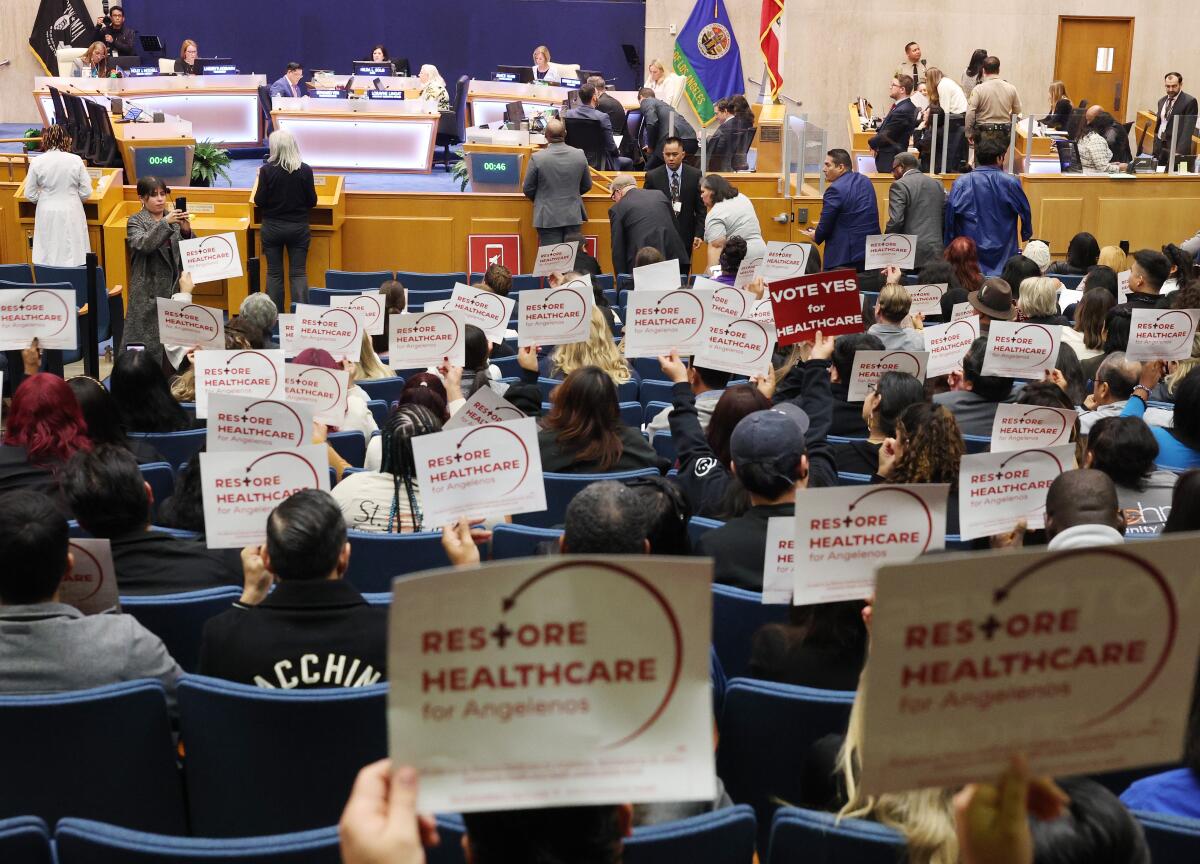Good morning, and welcome to L.A. on the Record — our City Hall newsletter. It’s David Zahniser, giving you the latest on city and county government.
Los Angeles Mayor Karen Bass did something this week that would have been unthinkable three years ago — she took an unprompted swipe at her counterparts in L.A. County.
Bass, while weighing in on L.A.’s so-called “mansion tax,” dinged the county for creating what she called a “bureaucratic” homelessness agency, saying it threatened to undermine the city’s progress on the crisis.
County Supervisor Lindsey Horvath hit back hard, telling Bass on X that the county created the new agency because the existing one — which is partly overseen by Bass appointees — was incapable of tracking its spending.
“The County is fixing the problems you’ve ignored,” Horvath said.
Things have been bad between Bass and Horvath for more than a year, with the two Democrats taking veiled, and sometimes not-so-veiled, swipes at each other. But could they become adversaries in the truest sense of the word — as head-to-head rivals in this year’s mayoral election?
You’re reading the L.A. on the Record newsletter
Horvath, who has spent months lining up endorsements for her own reelection campaign, has until Saturday to decide whether to enter the mayor’s race, challenging Bass’ bid for a second term. She told The Times she is seriously weighing a run — and “spending the weekend in deep reflection” with friends and family.
“From a young age, my faith has guided me through the most important moments of my life,” said Horvath, who is Catholic. “This is one of those moments.”
Bass, who is running in the June 2 primary for a second term, is already facing challenges from reality television star Spencer Pratt, former school superintendent Austin Beutner and community organizer Rae Huang, who has focused heavily on housing issues. Still, a Horvath bid would reshape the contest dramatically.
Beutner has not campaigned publicly since Jan. 5, one day before his 22-year-old daughter died of undetermined causes. Real estate developer Rick Caruso opted on Jan. 16 to stay out of the race, after sharply criticizing Bass for more than a year.
On paper, a Horvath mayoral bid looks somewhat risky. If she takes the plunge, she would no longer be permitted to seek reelection to her supervisorial seat, representing about 2 million people on the Westside and in the San Fernando Valley. Bass has been raising money for more than a year and has locked up key endorsements, including the Los Angeles County Federation of Labor.
If she runs, Horvath would face questions about the county’s difficulties, including a $4-billion legal payout over sexual abuse that has been marred by fraud allegations and a screwup surrounding Measure G, the 2024 ballot measure that will expand the number of county supervisors but also is on track to inadvertently repeal a criminal justice reform measure.
On top of that, there’s the secret $2-million payout to the county’s top executive.
Horvath said she’s seen recent polling that makes clear that “there’s an appetite for change” among Angelenos. Community leaders, residents of her supervisorial district and “those longing for a better Los Angeles” have been asking her to run, she said.
“I am listening carefully and seriously both to those who are urging me to enter this race, and to those who are eager to continue the work we have begun together at the County,” she said in a statement.
A spokesperson for the Bass campaign said he does not comment on prospective candidates. Pratt, for his part, said he’s rooting for Horvath to jump in so that “voters can see two career politicians calling each other out for the failed policies they both promoted.”
“Lindsey Horvath and Karen Bass are both responsible for the decline of our city, and the more they talk about each other, the more the public will see why we need a complete reset,” he said in a statement.
Even if Horvath doesn’t run, it looks like her relationship with the mayor will be rocky for the foreseeable future. The first-term supervisor has emerged as one of Bass’ most outspoken critics, highlighting an array of issues at City Hall.
Earlier this month, Horvath told The Times that she hears regularly from Angelenos who complain that they’re not getting basic services. She said that support within City Hall for Inside Safe, the mayor’s program to combat homelessness, is eroding.
Horvath has also taken aim at the city’s response to the Palisades fire, pointing out in a letter to Gov. Gavin Newsom that the Fire Department’s after-action report was watered down and then disavowed by its author. A day later, she told CBS2 that Bass was not being truthful about the county’s new homelessness agency.
Bass also has her own bully pulpit. On Friday, she stood outside federal court and railed against the indictment of independent journalist Don Lemon, calling it an “assault on our democracy.” Prosecutors have accused Lemon of violating federal law while reporting on a protest inside a Minnesota church.
The strained relations between Bass and Horvath are noteworthy given the mayor’s heavy focus on collaboration early on in her administration, when she triumphantly declared she was “locking arms” with a wide array of elected officials — including county supervisors — in the fight against homelessness.
Bass has attempted to stay above the fray, mostly avoiding direct conflict with other politicians — at least in public. But the Palisades fire, which destroyed thousands of homes and left 12 people dead, showed things weren’t always amiable behind the scenes.
Two weeks after the fires, Horvath and Bass were at odds over their joint public appearances, with Horvath complaining via text message that the mayor’s approach didn’t feel “very ‘locked arms.’”
Months later, Horvath and her colleagues on the Board of Supervisors voted to pull hundreds of millions of dollars from the Los Angeles Homeless Services Authority, moving the money to the new county homelessness agency.
Horvath said the change was urgently needed in the wake of highly damaging reports about LAHSA’s financial oversight. Bass, in turn, warned the move would create a “monumental disruption” for the city’s effort to bring unhoused residents indoors.
Last month, Bass published an opinion piece in the Daily News criticizing the county, pointing out that its new homelessness agency was already proposing cuts to programs that have served the city’s unhoused population.
Bass echoed that criticism in a recent interview, saying the cuts were proposed a year after voters approved a half-cent sales tax to fund homeless services.
Those reductions, if enacted, would scale back the operations of A Pathway Home, the county’s counterpart to Inside Safe.
“We are going to do the best we can without a full partner in the county,” Bass said.
Horvath, for her part, said she wants to scale back A Pathway Home because it is too costly — and is not achieving the success that county officials want.
State of play
— BACK TO THE DRAWING BOARD: City Councilmember Nithya Raman fell short in her attempt to send voters a ballot proposal rewriting Measure ULA, the tax on property sales of $5.3 million and up. Councilmembers said they did not even want to discuss the idea until it had been vetted by her committee.
— PIT BULL PAYOUT: The city paid more than $3 million last year to a woman who adopted a dog from the South L.A. animal shelter, only to have it attack her two days later. She later found out the dog had bitten a grandmother’s face. The case is raising questions about the way some shelter dogs are promoted on Instagram and other platforms.
— HEADING TO TRIAL: After a weeklong hearing, a judge ruled on Wednesday that the criminal case against Councilmember Curren Price can proceed to trial. Price, who has been charged with embezzlement, perjury and violations of conflict-of-interest laws, is slated to leave office in December. His lawyer said he did not act with “wrongful intent.”
— CLEARING CASES: Los Angeles police solved more than two thirds of homicides citywide in 2025, in a year that ended with the fewest number of slayings in six decades, according to figures released Thursday.
— GIVING TO GIBSON DUNN: The council signed off on a $1.8-million increase to its legal contract with Gibson Dunn, which is representing the city in the seemingly endless L.A. Alliance case. The increase, which passed on a 9-4 vote, brings the contract to nearly $7.5 million.
— PAYOUT PAUSE: Los Angeles County will halt some payments from its $4-billion sex-abuse settlement, as prosecutors ramp up their probe into allegations of fraud.
— LAPD VS. PROTESTER: A tense exchange between an LAPD captain and one of the Police Department’s most outspoken critics has gone viral.
— BATTLING TRUMP, PART 1: President Trump signed an executive order to allow victims of the Los Angeles wildfires to rebuild without obtaining “unnecessary, duplicative, or obstructive” permits. The order, which is likely to be challenged by the city and state, was immediately derided by Gov. Gavin Newsom, who said Trump should provide FEMA relief.
— BATTLING TRUMP, PART 2: Trump also vowed to fight the construction of new low-income housing in the Pacific Palisades burn area. L.A. officials say no projects are planned.
Quick hits
- Where is Inside Safe? The mayor’s signature program to fight homelessness went to the area around Gage Avenue at St. Andrews Place, located in the South L.A. district represented by Councilmember Marqueece Harris-Dawson.
- On the docket next week: Bass delivers the first of her two State of the City speeches, which has been billed as a “unifying celebration of Los Angeles.”
Stay in touch
That’s it for this week! Send your questions, comments and gossip to LAontheRecord@latimes.com. Did a friend forward you this email? Sign up here to get it in your inbox every Saturday morning.





